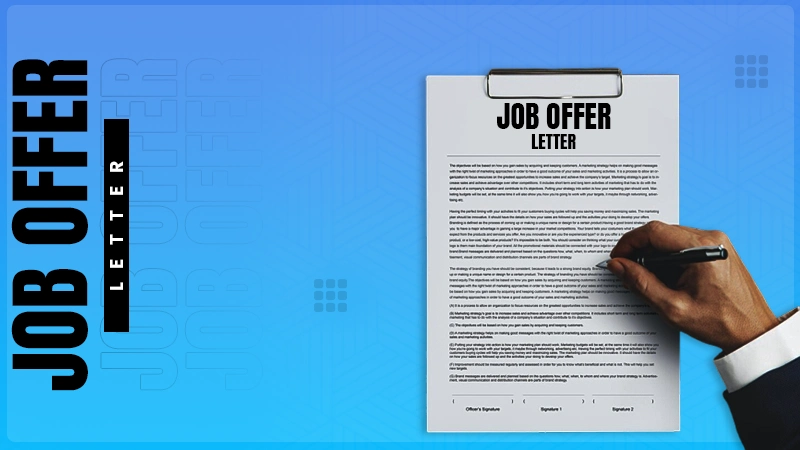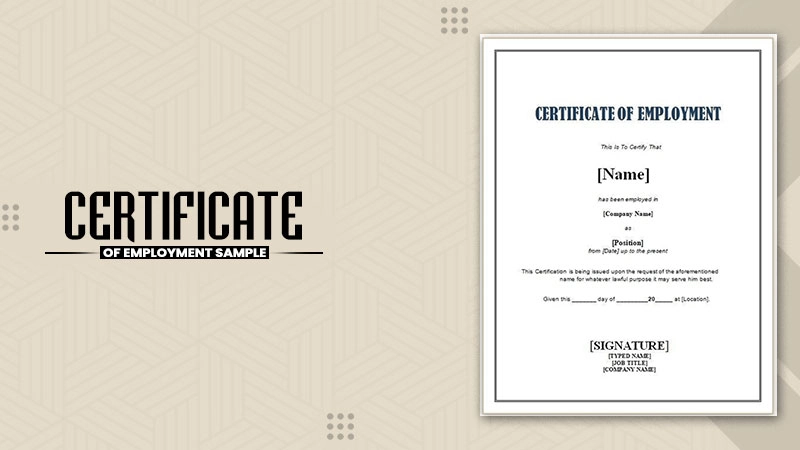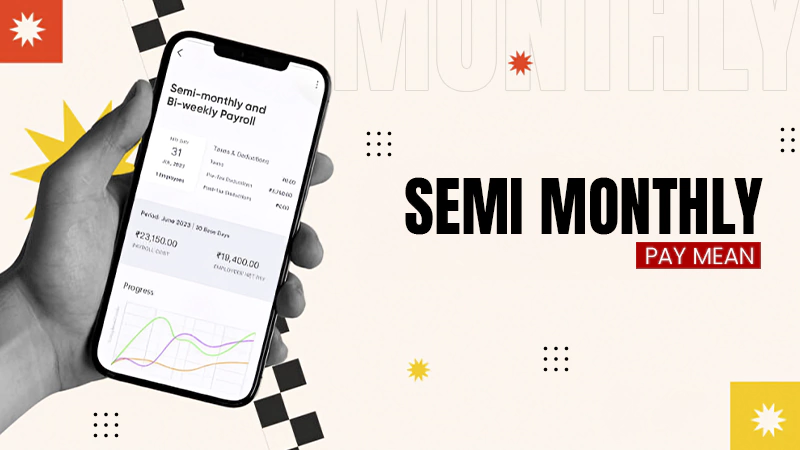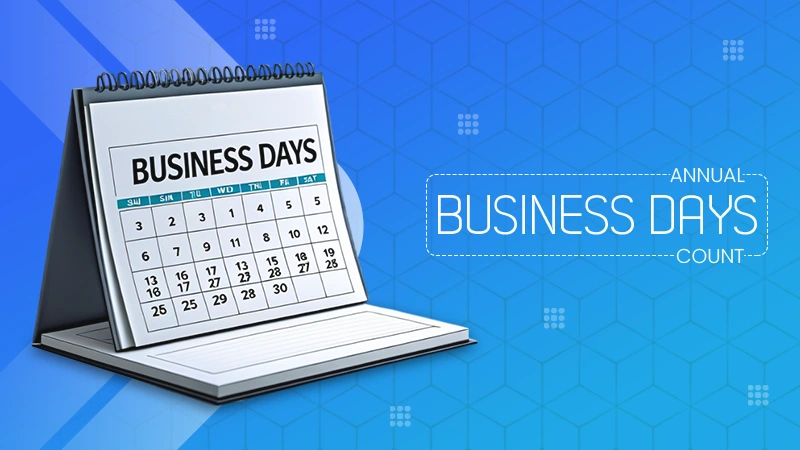An experience letter is a crucial document issued by the Human Resources (HR) department that formally acknowledges an employee’s role, duration of service, and overall contributions to an organization.
Whether for future employment, academic admissions, or immigration purposes, having a proper experience letter format is essential. However, there are some instances where these letters are released with incomplete information, which can negatively impact further professional opportunities.
So, to prevent yourself from the possible hurdles, stick around till the end and get your hands on the correct work experience letter format, explore polite ways to request it, and much more.
What is an Experience Letter?
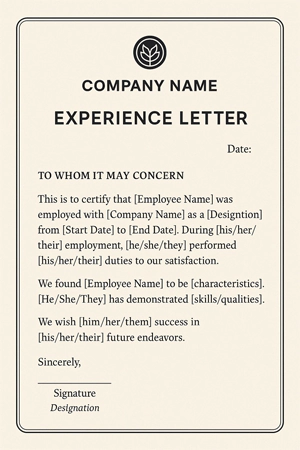
An experience letter is a formal document issued by a concerned authority or past employer, containing information related to your job tenure, performance, and more at the workplace.
It verifies the individual’s time with the company, roles, responsibilities, and overall accomplishments. This document works more than just a formality; it serves as proof of your work experience, and is often a key requirement during job applications, especially when transitioning to a new company or workplace.
Importance of an Experience Letter:
An experience letter is a key document that highlights your professional journey, skills, contributions, achievements, and more.
It not only validates your work but also sheds light on your credibility and potential. Here are some key points that explain why an experience letter is a must-have document.
- Proof of Professionalism: It serves as a demonstration of the employee’s work experience and supports all the claims mentioned in resumes and CVs.
- Career Advancement: An Experience letter is frequently required for further promotions, new workplaces, visa processes, or even higher education. In many workplaces, employees are legally bound to provide an experience letter upon joining.
Also Read: Top 10 Human Resource Management Tools in 2025
Key Components of an Experience Letter
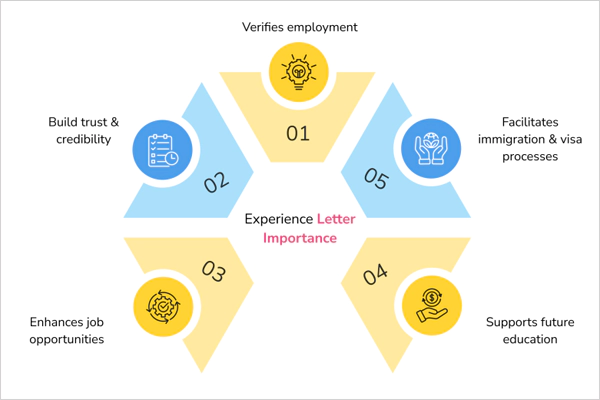
As mentioned, an experience letter is a legal document that is frequently demanded by your new company to verify your background, work experience, and more.
However, there are a few additional items that should be included in your experience letter in addition to these. The following is a list of the key components that an experience letter must include:
- Company Letterhead: The letter should be drafted on the official company letterhead, including the company name, address, logo, and contact information.
- Date of Issuance: Make sure the date on the letter matches with your last working day to avoid any last-minute delays.
- Employee Details: This includes the full name, designation, and department of the employee.
- Employment Duration: Clearly state the start and end dates of the employee’s tenure.
- Job Title and Responsibilities: A brief description of the employee’s job title and key responsibilities should be included in the letter.
- Skills and Achievements: Highlight any specific skills gained or notable achievements the employee gained during the employment period.
- Closing Statement: End the letter with a positive statement, often expressing best wishes for the employee’s future.
- Signature and Contact Information: The letter should be signed by an authorized representative of the company, along with their designation and contact details.
Now that you’ve a breakdown of the essential components of an experience letter in hand, let’s look at how each component fits in the document. The following section sheds light on the standard format used by most employers.
Standard Work Experience Letter Format
To maintain clarity and consistency across industries, most companies follow a standard work experience letter format that ensures all the relevant details are presented with a professional touch and accuracy.
Here’s a sample attached for your reference; you can take an idea and draft your email to request an experience letter according to your will.
| Subject: Request for Experience Letter Dear [Manager’s Name / HR Department], I hope this email finds you well. I am writing to request an experience letter for my time working with [Company Name] as a [Your Job Title] from [Start Date] to [End Date]. Not only that, but I am currently in the process of [explain your reason briefly, such as applying for a new job, pursuing higher education, etc.], and an experience letter outlining my job responsibilities, skills, and contributions during my employment would be incredibly helpful. If you require any additional information to process this request, please let me know. Thank you for your time and consideration. I look forward to your response. Best regards, [Your Full Name] [Your Position] [Your Contact Information] [Your Employee ID (if applicable)] |
Sample Experience Letters for Different Industry Standards
Here are some sample experience letter tailored to different industry standards. Each sample letter follows a professional format and highlights role-specific achievements and skills.
1. IT Industry – Software Developer
| To Whom It May Concern, This is to certify that the individual was employed with our organization as a Software Developer from [Start Date] to [End Date]. During this period, they were involved in full-stack development projects utilizing technologies such as Java, Spring Boot, Angular, and MySQL. They contributed to the design and implementation of enterprise-level applications and consistently demonstrated strong problem-solving and programming skills. Their contributions were valued, and we wish them continued success in their professional journey. Sincerely, [Designation/Department] [Company Name] |
2. Education Sector – High School Teacher
| To Whom It May Concern, This is to confirm that the individual served as a High School English Teacher at our institution from [Start Date] to [End Date]. They were responsible for teaching English to senior classes and participated actively in curriculum planning and extracurricular activities. Known for their effective teaching style and commitment to student growth, they were a valued member of the academic team. We wish them all the best in their future teaching roles. Sincerely, [Designation/Department] [School/Institution Name] |
3. Hospitality Industry – Front Office Executive
| To Whom It May Concern, This letter is to certify that the individual worked with us as a Front Office Executive from [Start Date] to [End Date]. Their duties included managing front desk operations, handling reservations, and ensuring guest satisfaction. They maintained professionalism in guest interactions and demonstrated excellent communication skills. We thank them for their service and wish them success in their future career. Sincerely, [Designation/Department] [Hotel/Company Name] |
4. Manufacturing Industry – Production Supervisor
| To Whom It May Concern, This is to confirm that the individual was employed as a Production Supervisor from [Start Date] to [End Date] with our organization. They were responsible for overseeing production activities, ensuring compliance with safety standards, and coordinating with internal teams to meet output goals. Their leadership and organisational skills were an asset to our operations. We extend our best wishes for their future endeavours. Sincerely, [Designation/Department] [Company Name] |
Now that you know how experience letters are drafted across various industries, it’s important to acknowledge that the method to request one remains largely the same.
Regardless of your industry and field, a respectful approach goes a long way, hop into the section to know how to request an experience letter in a polite and professional manner.
Also Read: How Many Work Hours in a Month? Average & Calculation Guide
How to Request an Experience Letter?
You need to draft a formal email to your HR department or other concerned authority to request an experience letter. It should include your name, job title, department, employment dates, and most importantly, an explanation of why you need the letter.
So, here’s a step-by-step guide for you on how to request an experience letter:
Step 1: Understand Why You Need That Letter
Before requesting an experience letter, make sure you know why you require it. This will help you communicate your needs precisely with your employer. Some common reasons to request an experience letter include:
- Job application.
- Higher education applications.
- Immigration or visa purposes.
- Professional development or certification.
Additionally, check if your company has any specific guidelines or templates for issuing experience letters. Some companies may have a formal process or require a certain amount of notice.
Step 2: Write a Formal Request (Email or Letter)
You’ll need to write a formal request for an experience letter to your head HR or Reporting Manager. Make sure to keep the tone polite, clear, and professional. Here’s a template for your reference:
| Subject: Request for Experience Letter Dear [Manager’s Name/HR Department], I hope this email finds you well. I am writing to request an experience letter for my time working with [Company Name] as a [Your Job Title] from [Start Date] to [End Date]. Not only that, but I am currently in the process of [explain your reason briefly, such as applying for a new job, pursuing higher education, etc.], and an experience letter outlining my job responsibilities, skills, and contributions during my employment would be incredibly helpful. If you require any additional information to process this request, please let me know. Thank you for your time and consideration. I look forward to your response. Best regards, [Your Full Name] [Your Position] [Your Contact Information] [Your Employee ID (if applicable)] |
Step 3: Provide Additional Information
If your employer asks for more details about your role or achievements during your tenure, provide them immediately.
You can offer them a bullet-point list of your major contributions, key skills, or notable projects you worked on if you feel it will help them write a more comprehensive letter.
Step 4: Follow Up (If Necessary)
If you haven’t received a response within a reasonable amount of time (usually 1–2 weeks), you can follow up with a polite reminder. Here’s an example:
| Subject: Follow-Up: Request for Experience Letter Dear [Manager’s Name/HR Department], I hope you are doing well. I just wanted to follow up on my previous email regarding the request for an experience letter. If there are any updates or if you need any more information from my end, please do let me know. I appreciate your time and assistance. Best regards, [Your Full Name] |
Step 5: Review the Letter and Request for Changes (If Needed)
Once the experience letter is issued, make sure to review it thoroughly. The letter should include the following information:
- Your full name and designation (make sure to double-check the spelling and other basic details).
- The duration of your employment (start and end dates).
- A summary of your job responsibilities and achievements.
- Any special skills or qualifications you gained during your employment.
- The company’s official letterhead and the signature of the authorized person.
Additionally, if any information in the experience letter is incorrect, or you want some edits, don’t hesitate to ask your employer for revisions. Be polite and professional in your request for changes.
Final Tips:
- Give Sufficient Time: Employers may take time to process such a request, so it’s best to ask well in advance.
- Be Polite and Respectful: The tone of your request should always be professional and respectful, as this is a formal document.
- Follow the Company’s Procedure: Some companies have a formal procedure for issuing experience letters, so be sure to follow that if applicable.
It is an employee’s right to request an experience letter, but the story doesn’t end there. Both employees and employers have legal rights and responsibilities to fulfil while requesting and issuing one. So, let’s explore some legal and other considerations in the following section.
Also Read: Imputed Income Explained: Meaning, Examples, and Tax Implications
BONUS – Legal and Other Considerations
When requesting or issuing an experience letter, both legal and non-legal considerations should be taken into account to ensure that the document is accurate, appropriate, and doesn’t create potential issues for either party (the employee or employer).
Below are the legal and other factors that one needs to consider:
1. Legal Considerations for an Experience Letter:
Not considering the legal factors while requesting an experience letter can prove to be downhill for you. So, to save you from the potential trouble, here are some pointers mentioned that you need to consider:
- Accuracy and Truthfulness: An experience letter must accurately reflect the employer’s job title, designation, dates of employment, and responsibilities. Providing false or misleading information can lead to legal consequences for both the employer and the employee.
- Negative Slander: Employers must be cautious not to include any defamatory or negative comments about an employee in the letter, as this can lead to legal actions for slander or libel.
- Privacy and Confidentiality: Employers should avoid mentioning sensitive personal information without the employee’s consent. Such as avoiding mentioning salary, reasons for leaving, disciplinary actions, or health status.
2. Non-Legal Considerations for an Experience Letter:
While legal accuracy is essential whenever you’re drafting an employment letter, some non-legal factors also shape the whole value.
These non-legal considerations are primarily focused on tone, presentation, clarity, and overall impression. So, here are some pointers highlighting the other considerations for an experience letter:
- Professional Tone and Format: First and foremost, extremely necessary to maintain a formal, respectful tone throughout the letter to maintain ethical professionalism.
- Clarity and Brevity: The letter should be concise yet informative; it should not be too long or too short (one page is the ideal length).
- Positive Framing: Whenever you’re making an exit from a company, no matter how it ended (neutrally or slightly negative), the tone of your experience letter should always remain constructive and courteous.
By now, you’ve a clear understanding of what an experience letter is, how to request one, the standard format, and the legal and other considerations involved during the whole process.
So, before we head towards a final takeaway, just remember – how you ask for it matters a lot. Asking it politely and respectfully will help create a positive legacy and strengthen your professional journey.
Wrapping Up!
An experience letter may seem like a regular HR document, but it is much more than that!
Understanding the fundamental components and legal guidelines is fundamental, regardless of whether you are an employee seeking one or an employer issuing one, make sure to request and release it precisely.
Moreover, always make sure to stick around to the standard format and keep the legal and other considerations in mind while requesting or issuing one.
FAQ’s
1. What is an experience letter?
Ans: An experience letter is an official document provided by an employer to an employee upon resignation, certifying the employee’s role, duration of employment, and performance during the tenure.
2. What should be included in an experience letter?
Ans: A standard experience letter usually includes:
- Company’s letterhead
- Date of issuance
- Employee’s full name
- Job title/designation
- Department (optional)
- Duration of employment (start and end date)
- Nature of employment (full-time/part-time/contract)
- Summary of responsibilities (optional)
- Conduct and performance comments (optional)
- Signature of the authorized person
- Company stamp (optional but preferred).
3. Is an experience letter the same as a relieving letter?
Ans: No, an experience letter confirms the duration and nature of your work. A relieving letter is issued when an employee has formally resigned and completed all exit formalities.
4. Can an experience letter be issued before the last working day?
Ans: Generally, no. It is issued after the employee has completed their notice period and formalities. However, some companies may issue it on the last working day.
- Experience Letter Sample, by Indeed
